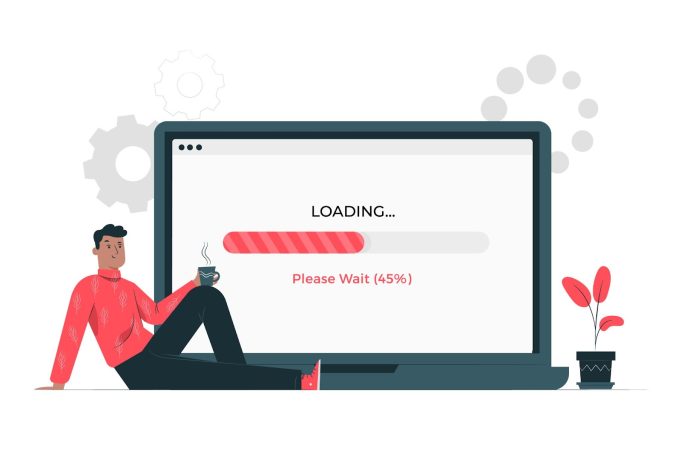Have you ever landed on a website only to find yourself drumming your fingers on the desk, staring out the window, waiting for the content to load? We’ve all been there, and let’s be honest, it’s beyond frustrating.
In this tech-driven age where everything seems to move at the speed of light, slow loading speeds can be a major roadblock in our digital journey. So, grab a cup of coffee and let’s dive into the heart of the matter: why slow loading speeds are the biggest problem in website hosting and how you can fix it.
The Biggest Problem: Slow Loading Speeds
So, loading speed is the biggest culprit chasing traffic away from your website. If you want those visitors to come again (and stay, this time), tackling your website speed should be first on your to-do list.
Why Are Slow Loading Speeds a Problem?
Picture this: you’re searching for a recipe, researching a topic, or maybe indulging in some online retail therapy. You click on a link that piques your interest, excited to explore what’s in store. But, alas, the page takes its sweet time to load, and suddenly your enthusiasm is squashed like a bug. That’s right, slow loading speeds can be a real mood killer.
But it’s not just about impatience. Slow loading speeds can have some serious consequences for websites and businesses too. Research suggests that a whopping 40% of visitors will drop your website like a hot potato if it takes longer than 3 seconds to load.
That’s potential readers, customers, or clients slipping through the digital cracks! Plus, search engines like Google check loading speed for their ranking algorithms, which means slower websites might end up buried deep in the search results abyss. Ouch!
Factors That Can Contribute to Slow Loading Speeds
Now that we’ve established why slow loading speeds are a big no-no, let’s unpack the culprits behind this digital conundrum. There are a handful of factors from the web hosting side that can conspire to slow down your website’s load time:
Outdated Hardware
Imagine running a marathon in old, worn-out shoes–you’d probably struggle to keep up with those in their fancy new Nikes. Well, outdated hardware is like those worn-out shoes when it comes to technology… And it can keep your website at the back of the pack where it goes relatively unseen.
Slow Brain
By brain, we mean processor. The processor is like your web host’s brain, handling tasks that you feed it. Modern websites need a lot of brainpower to work well, and old processors can’t keep up. Think of it like trying to teach a 5-year-old quantum physics—their brains just aren’t quite there yet.
Memory Issues
Think of RAM like short-term memory. Poor memory skills mean the device needs to think harder to “remember” what it needs to do, which can cause lag. So when they need to do something detailed, like open a website, they can slow down quite considerably.
Security Setbacks
A common consequence of outdated hardware is missing out on important security updates. This can make the server slower, as it bumbles around handling potential threats. It’s kind of like one of those chubby cops, donut in hand, chasing after a thief… It’s just not going to happen. And with cyber threats continuously poking at it, your site is likely to slow down even more.
Heavy Images and Media
We all love stunning visuals, but if your website is packed with high-resolution images, videos, and animations that aren’t properly optimized, they can become a load-time nightmare as they weigh the server down.
Excessive Plugins and Scripts
While plugins and scripts can add functionality and flair to your site, an overabundance of them can overload your website’s performance, causing it to lag. Have you ever tried hiking while carrying a heavy pack full of irrelevant objects? That’s what a ton of plugins does to your site.
Unoptimized Code
Messy and unoptimized code can make your website resemble a tangled web of confusion for browsers, leading to slower loading times as the browser tries to figure out what’s going on here.
Server Issues
Your web host’s server plays a vital role in delivering your content to users. If it’s not up to snuff or experiencing issues, your website’s loading speed will bear the brunt of it.
How Can You Fix Slow Loading Speeds?
But, enough with the doom and gloom. The good news is that slow loading speeds are a fixable problem. Here are some strategies to get your website up to speed (before you have to even consider changing to a new web host).
Optimize Images and Media
Before you upload that breathtaking image or engaging video, make sure to compress and resize them appropriately without sacrificing quality. Your website visitors (and your load times) will thank you.
Trim the Excess
Take a good, hard look at your plugins and scripts. Are they all essential? If not, it’s time for some digital decluttering. Keep only what truly enhances user experience and get rid of those “it might be useful one day” plugins.
Streamline Code
If you’re not a coding whiz, no worries. You can find a bunch of tools (both free and paid) to help clean up your website’s code, making it more efficient and less of a headache for browsers.
Upgrade Your Hosting
If your website is outgrowing its hosting plan, it might be time to level up. If your web host is scalable, see which plan you can upgrade to. If not, then look for hosting services that offer better performance and faster loading times.
Conclusion
The biggest problem with website hosting isn’t nearly as dreadful as it might initially sound. While slow page loading speeds can definitely annoy visitors and chase away business, it’s a problem that can be improved monumentally with just a few smart actions.
Before you go all out and banish your current web host to the digital trash can, make your own changes. You might be surprised at what a change they make!
About the Author
Paul Wheeler runs a web design agency that helps small businesses optimize their websites for business success. He aims to educate business owners on all things website-related, at his own website, Reviews for Website Hosting.
















